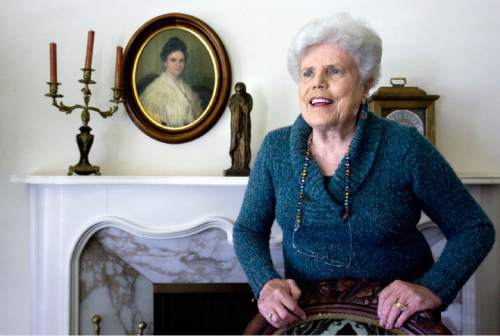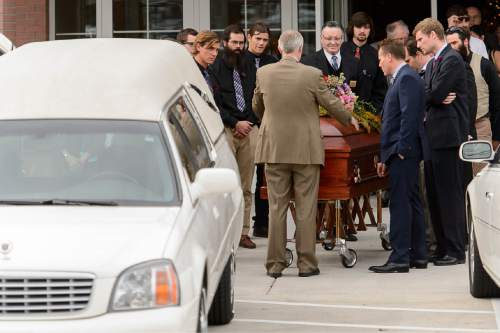This is an archived article that was published on sltrib.com in 2014, and information in the article may be outdated. It is provided only for personal research purposes and may not be reprinted.
Emma Lou Warner Thayne held no high office in the LDS Church. She won no election. She was not the director of some huge organization or the faith's General Relief Society president. Nor was she married to a Mormon prophet.
Yet nearly 1,000 people showed up Friday for her funeral at an LDS meetinghouse in east Salt Lake City to pay their last respects.
The crowd boasted a veritable "who's who" of Mormon writers and thinkers, including Linda and Jack Newell, Grethe Peterson, Louise Degn, Aileen Clyde, along with civic leaders such as homeless advocate Pamela Atkinson and former U.S. Rep. Karen Shepherd.
Thayne, who died Dec. 6 of congestive heart failure at age 90, gained her admirers one at a time through the power of her personality and her poetry.
She was also a trailblazer, becoming the first woman on the board of the LDS Church-owned Deseret News with her longtime friend, Thomas S. Monson. She helped establish a women's tennis team at the University of Utah and became its first coach.
Speakers at the service included Thayne's Mormon bishop, five daughters (or "the committee," as they were known in the family), a friend, a granddaughter and LDS apostle Jeffrey R. Holland.
Monson, the current president of The Church of Jesus Christ of Latter-day Saints, deputized the apostle to speak in his stead, Holland said, so the Mormon prophet could host a long-arranged Christmas party at the same time for LDS general authorities.
Thayne was like "Emily Dickinson, Eleanor Roosevelt, Eliza R. Snow and the entire U. women's tennis team" all rolled into one, Holland said. "Her poetry and her life made us see ourselves more clearly, joyfully and, may I say, more fiercely than we would have otherwise."
She was more than a poet, more than an activist for every cause she ever knew, the apostle said, "she was a force of nature."
In short, he quipped, "Emma Lou was always good at getting me to do things I didn't want to do."
Longtime friend June Nebeker remembered Thayne dragging her to the U.'s Kingsbury Hall on a cold, snowy New Year's Eve some years ago for an event sponsored by the World Peace Association.
The poet spoke about her work for peace and, at the stroke of midnight, there was no confetti or kissing, Nebeker recalled, only silence, which was more potent than words.
Still, words "called out to her," said daughter Dinny Trabert, "always."
Her mother saw language as "magic, power, ideas and praise," daughter Rinda Hayes added.
To the end, speakers said, Thayne — who always called herself "Lucky Louie" — expressed gratitude, even for the congestive heart failure that would take her quickly and easily.
The literary giant's last LDS Church duty was as a "greeter," Thayne told Nebeker, where she would stand at the door of her Mormon chapel and hug every person who entered.
"I don't think that's the job description in the LDS handbook," her friend said, to which Thayne retorted, "It's in my handbook."
Indeed, Nebeker said, the poet was a "hugger of life," who followed her faith and her church but with her own compass.
The service ended with the congregation joining with a violin, viola and organ for a haunting rendition of the well-loved and poignant hymn Thayne penned, "Where Can I Turn for Peace?"
Twitter: @religiongal





